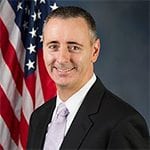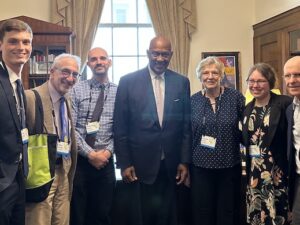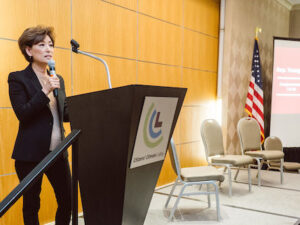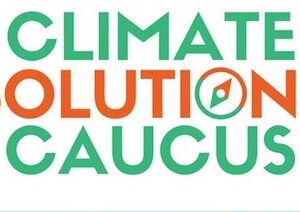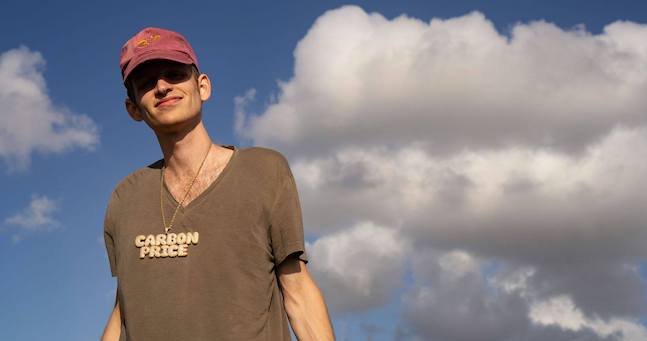
Singer-songwriter Dane Myers
Episode 86: Harnessing Local Political Power for Climate Change Solutions
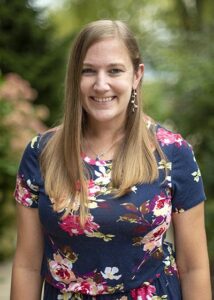
Brandi Robinson
As climate advocates, we want to get everyone engaged in some sort of climate action. When it comes to taking on global climate change, people can feel overwhelmed with the scale of the problem, and then they shut down. Brandi Robinson, Associate Teaching Professor in Energy and Mineral Engineering at Penn State University says, “You don’t have to make climate change someone’s top priority. You have to connect climate change to what they already care about, and figure out how you can work together on that.” She recommends we begin locally.
Brandi has been collaborating with her colleague Dr. Peter Buck, a sustainability and climate change professional, public servant, and educator. Together they co-direct the Centre Region Climate Action Program in Pennsylvania. Their work focuses on the local responses to global climate change, with specific interest in community-scale climate action planning.
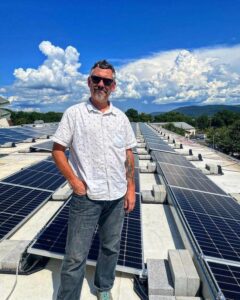
Dr. Peter Buck
In order to guide the municipality and region to meaningful climate mitigation and adaptation plans, Peter ran and won local office. “When I got elected,” Peter says, “I knew that I wanted to create a climate action plan without actually calling it a climate action plan. Because I didn’t think that our region was ready for something that you would call it that. What I started doing was thinking about, okay, where are the things that Ferguson township does? Where can I influence whatever is happening?”
The efforts have been wildly successful. They not only saw the passage of Ferguson Township Resolution 27-14, a commitment to achieve net zero emissions by 2050, but region-wide they have multiple climate mitigation, adaptation, and education programs in place.
In this episode, they not only share their successes, but they also reveal the best practices, strategies, and approaches that you can use in your own town and region.
Listen Now!
Resilience Corner
There is no need to be overwhelmed in your climate work, especially when we use the resiliency tool at hand. In her latest installment of the Resilience Corner, Tamara Staton connects our climate work with an emotion that doesn’t often come up — joy. And speaking of joy, check out the silly TikTok that podcast host Peterson Toscano made with Tamara in Portland, Oregon’s Forest Park.
The Resilience Corner is made possible through a collaboration with Tamara Staton, Education and Resilience Coordinator for Citizens’ Climate Education. For more tips, strategies, and practices to stay strong and steady in your climate work, visit The Resilience Hub.
Good News
Singer-songwriter Dane Meyers hung out with volunteer climate lobbyists in D.C. Together they created the “Live, Laugh, Lobby” song and music video.
Blending the mediums of music, video and climate activism, Dane has a long history of making sustainability feel less like a nightmare and more like a creative adventure. Beginning in 2019, his converted Tesla Model 3 became his home and recording studio for 18 months. The project showcased the unique capabilities of electric vehicles and led to a 17-song album entitled “The New American Dreamers.”
Eager to connect with others, Dane is gearing up for his next adventure — a series of intimate living room concerts along the East Coast. These performances aim to spark interest in sustainability and inspire audiences to both process the deep losses of environmental devastation while celebrating the adventure into sustainability. Learn more at his website.
Listener Survey
We want to hear your feedback about this episode. After you listen, feel free to fill in this short survey. Your feedback will help us as we make new decisions about the content, guests, and style of the show. You can fill it out anonymously and answer whichever questions you like.
You can hear Citizens’ Climate Radio on:
Also, feel free to connect with other listeners, suggest program ideas, and respond to programs in the Citizens’ Climate Radio Facebook group or on Twitter at @CitizensCRadio.
Read the Transcript
Episode 86: Harnessing Local Political Power for Climate Change Solutions
SPEAKERS
Peter Buck, Tamara Staton, Brandi Robinson, Peterson Toscano, Dane Myers
Peterson Toscano 00:00
Welcome to Citizens Climate Radio, your climate change podcast. In this show, we highlight people’s stories we celebrate your successes, and together with your strategies for talking about climate change. I’m your host Peterson Toscano Welcome to Episode 86 of Citizens Climate Radio, a project of Citizens Climate Education. This episode is airing on Friday, July 28 2023. On today’s show, we have a good news story that comes with a song singer songwriter Dane Meyers hung out with volunteer climate lobbyists in DC. Together, they created the Live Laugh Lobby song. In the Resilience Corner Tamar Staton connects our climate work with an emotion that we don’t often think of when it comes to climate change, Joy.
Peterson Toscano 01:03
But first, I speak with two climate advocates who have used their personal power to influence their University’s sustainability policies. They decided to take the work to the next level, first to their municipality, and then an entire region. Dr. Peter Buck and Brandi Robinson are colleagues at Penn State University. Peter is the Associate Director of Climate and Sustainability Education. Brandi, is an associate teaching professor in energy and mineral engineering. In addition to chairing the technical advisory group for the center region’s climate action and adaptation plan. Brandi also co-directs the local climate action program with Peter.
Peterson Toscano 01:46
Working for a university keeps both Brandi and Peter very busy, but that doesn’t stop them from finding creative and effective ways to motivate their community and region to take on climate change. In fact, in his spare time, Peter ran for local office. Both Brandi and Peter are brimming with enthusiasm. When it comes to solutions to address the causes and impacts of climate change. They refuse to take no for an answer. We recently met online to talk about their community work. From our conversation, you will learn about the vital role local political power plays and taking on climate change. I need to warn you though their enthusiasm is contagious.
Brandi Robinson 02:34
I work on local solutions to climate change.
Peter Buck 02:37
I work at Penn State’s Sustainability Institute where I work on academic and outreach solutions to climate change. I’m also an elected official. I served on the Ferguson Township Board of Supervisors and I currently serve on the State College Area School Board.
Brandi Robinson 02:55
I think my most important identity right now is that I am a mother. I have an 11 year old daughter and I think that that really frames a lot of my thinking about what I want the future to look like. And I’m an avid Thrifter.
Peter Buck 03:09
I am the father of a 15 year old boy. I am engaged to a wonderful woman named Hilary. I’m a person with a kind of hopeless amount of energy. I singlespeed mountain bikes and play heavy metal music. I just learned six iron maiden guitar solos, which I’m very excited about and I’m a recovering alcoholic.
Peterson Toscano 03:36
Hopelessly energetic is definitely a great way to describe you. I’m sure people who work close to yours like when can you slow down? We can’t keep up. Yeah. And for listeners who don’t know, you know, they hear college or university explain the scale of the university that you work for.
Brandi Robinson 03:59
We have our own zip code at this campus. So it is functionally really much more akin to a city or municipality than a college campus. It’s got quite a big physical footprint.
Peter Buck 04:12
Penn State has about 40,000 or 45,000 students at its main campus with a budget of around $7 billions. That’s billions with a B when it comes to things related to say climate change. We are an elite university in terms of our research and the application of knowledge around renewable energy, nuclear power, the science of climate change, environmental and water related sciences, green buildings, the grid, the things that people think about practically every day that have to do with mitigating or adapting to climate change Penn State Does an awful lot of work. It’s also true that we are historically one of the biggest researchers of fossil fuels, as well. So people make a joke sometimes and call us frack Sylvania State University. Because we’ve done a huge amount of research into natural gas. I believe we are in the top two in terms of coal research, as well.
Peterson Toscano 05:26
Tell me the story about how you all got involved with getting off a campus into local government.
Peter Buck 05:34
I was elected to the Ferguson Township Board of Supervisors in November of 2015. I initially ran, because there was a land use dispute about a housing development that local environmental groups were in and individuals were very upset about this. Someone said, you know, we need people to run and I went, Hey, maybe I’ll do that. And then I decided to do it. When I got elected, I knew that I wanted to create a climate action plan without actually calling it a climate action plan. Because I didn’t think that our region was ready for something that you would call it that what I started doing was thinking about, okay, where are the things that Ferguson township does? Where can I influence whatever is happening?
Peter Buck 06:23
And so the first thing that happened was we were looking at a stormwater ordinance. And talking about the stormwater ordinance, I was able to and with other members of the board, who were pretty aware, I was able to talk about increased precipitation at certain times of year, and that peak events were getting more intense. So we had to have an adaptive capacity in the regulated stormwater infrastructure that could deal with that. The next thing was in the budget discussion, we had a public works facility coming up for design. I had talked with then chair, Steve Miller. And I said, What do you think about requiring that it meet LEED Gold Leadership and Energy and Environmental Design Gold, then we can influence its design to maximize energy efficiency, and also have on site really good best management practices for stormwater? He said, I think that’s great. And I said, we can do native plantings and all these kinds of things. And that passed five to zero, and it was for Democrats and one Republican who voted for that.
Peter Buck 07:38
In 2017, it became very clear that Donald Trump was going to withdraw the United States from the Paris Agreement. I had been working with a gentleman who Brandi knows as well, Don Brown. He and I had co authored a resolution about achieving net zero greenhouse gas emissions for some totally different thing it had to do with I was like a bunch of organizations in Pennsylvania, and it was just going nowhere. And I thought, Oh, I know what I’ll do. I’m going to change this resolution. And I’m gonna make it for Ferguson Township. I did, and you can read it, it’s resolution 2017-14, it says that we will achieve net zero greenhouse gas emissions by 2050. And in order to do that, it has to be economically feasible, transparent and fair. We formed an ad hoc committee, because that’s what the government will do, right? To tell itself how it’s supposed to proceed. Immediately after the passage of that vote, I reached out to Brandi and I said you should chair this committee.
Brandi Robinson 08:48
You are definitely right, that when Trump announced that we would be withdrawing from the Paris Agreement that puts a whole new emphasis on local action. But I would argue that was already bubbling to the surface, after the US kind of didn’t really seal the deal on Kyoto, even even all the way back then local governments started to realize, well, we probably aren’t going to be able to just sit around and wait for a federal response. And then I think that’s super kicked into high gear with the Trump administration.
Brandi Robinson 09:20
Because at the end of the day, the impacts of climate change are felt locally. It’s our local elected officials and our local organizations who have to respond to those impacts and deal with them and pay for them, understanding our changing climate and not only what we can do to mitigate against the causes of those changes, but also to prepare for these impacts along the way, is inherently local work that needs to be done.
Brandi Robinson 09:49
When Peter asked me if I would chair this committee I was super excited because I had done my graduate research on local scale responses to climate change. Looking at this University Park campus here of Penn State as a testbed of local action. And then after I graduated, I expanded that work working for our Office of Physical Plant to all of our commonwealth campuses, to get an idea of what our university footprint was and what we could start to do about it. This was really bringing me back to work that had been near and dear to my heart. In grad school, we formed a committee. First things first, we needed to do a greenhouse gas emissions inventory, Peter and friends had already committed us to reducing those emissions to zero. And we didn’t know what those were yet. So. So that was the first order of business, we undertook that those emissions inventories are imperfect estimates, but they are very useful planning tools. And if you then replicate them, using the same methodology, you can at least compare imperfect apples to imperfect apples, and see if you’re making progress.
Brandi Robinson 10:57
Throughout the course of our inventorying work, the region started to take notice, and hired a sustainability planner, with the specific task of creating a regional emissions inventory, and eventually a climate action and adaptation plan. For these purposes, the center region includes six municipalities of which Ferguson is one, we kind of then put our own Ferguson work on hold to help support the effort happening at the region, recognizing that it wouldn’t really make sense for us to have six highly individualized, totally developed in silos, emissions inventories, or climate action plans, we all kind of identify as State College in the center region, it’s basically the six municipalities that make up the school district, I think, you know, while this regional work is happening, Penn State whose University Park campus is kind of right in the middle of that region. And they’re also continuing to do work. And we’re trying to work together to see where we can build partnerships and tackle these things collectively, so that we aren’t just all kind of spinning in our own hamster wheels.
Brandi Robinson 12:08
One of the biggest challenges for climate change as an issue. I mean, there are many things that if you spend too much time looking at it as a global problem, it can be very depressing. The doom and gloom of climate change can be a very real barrier to doing anything. You know, I see this with students all the time, they genuinely want to know what they can do to make a difference. And while individual action on its own is not going to save us, I also think it’s counterproductive to tell them well, it doesn’t actually matter if you recycle that that’s the wrong message to working on this at the local scale in my community, where where I live and work and have a connection to that helps me compartmentalize it in a way where I feel like I’m doing something meaningful, that is actually creating change. Right here where I live.
Brandi Robinson 13:03
I’m a big fan of, and I think this is probably because just as a person in general, I’m very conflict averse. So I’m a big fan of diffusing all of the political nonsense out of the issue of climate change. At the end of the day, caring about climate change is actually, I would argue, one of the most selfish endeavors we can take as a species because we are trying to save our own tails. This is not about polar bears, and it never was. We need the climate to be stable and healthy so that we have a habitable planet for ourselves. If you want to think about it, selfishly, you can if you want to think about it more altruistically about protecting biodiversity and all of other things for their own intrinsic value. That’s good, too. But it doesn’t have to be that when you open that up to being about saving our own tails to you open the opportunity for collaboration with many more people. You don’t have to make climate change someone’s top priority. You have to connect climate change to what they already care about, and figure out how you can work together on that.
Peter Buck 14:08
I wholeheartedly agree with everything that Brandi said. In fact, in our local climate action program, classes that we teach, we ground everything basically in a love of home. We all live in a place. It is very likely at this point that people there are quite aware of how the anthropogenically changed climate has impacted their lives.
Brandi Robinson 14:39
People just currently don’t know where to start. I just moved into a new house this summer. And it’s a new build. So I have a blank canvas of what I can do with my yard. I want to make thoughtful decisions and do native plantings and things that will be good for our pollinator friends.
Peter Buck 14:57
Whether it’s adaptation or mitigation. And one of the best things that you can do is to talk about climate change in a value centered, scientifically valid way that is also focused on what we can do as individuals and together. So that’s the thing that any individual can do, you can just talk about it with people, you know, don’t underestimate the power of pooled donations. We have Clear Water Conservancy here in central Pennsylvania, individuals, and individual farmers, in particular, the Meyer family, they had a tract of land, individuals and municipalities worked together to fund a large riparian buffer. That’s an adaptation that is good for a tributary of a class, a sectional value trout stream in central Pennsylvania. And then the other thing that individuals can do is lobby and vote, lobby and vote, lobby and vote, lobby and vote your municipal officials, your school board, directors, your representatives in the state house, your state senators, your county commissioners, you can go to a meeting and say something better yet ask them out for coffee, talk with them, get to know them, what makes them tick, connect climate change to that climate change is a social problem. It’s a social problem. If each of us does some small role that actually is pooling, and by aggregating that you aggregate power and change, and that’s awesome. That’s what we need.
Peterson Toscano 16:54
That was Peter Buck and Brandi Robinson from State College, Pennsylvania. To learn more about their work at Penn State, visit sustainability.psu.edu. They’re both active on social media, learn how you can follow them by visiting our show notes at CCL usa.org/radio. That’s CCL usa.org/radio.
Peterson Toscano 17:27
Now it is time for the resilience corner with Tamara Staton.
Tamara Staton 17:38
I’m Tamara Staton. And this is the resilience corner. I’m excited to dive into our new series called Resilient Climateteering Through Unexpected Climate Connections. This isn’t a series about weather or science or graphs or data. Instead, it’s about concepts that help us worry less and act more on climate explored through a lens of playful curiosity. Together, we’ll explore how to enjoy what matters so deeply so that we can be as effective as possible for as long as we’re needed.
Tamara Staton 18:13
Today’s topic is joy and climate, two rarely connected concepts that actually have quite a powerful relationship. It’s no surprise that most of us don’t associate the idea of joy with climate change. But what if we did, whatever the thing that we’re most worried about could actually be a source of energy that continually motivated us to take action, and inspire others to do the same? First things. First, though, I know that there’s a common concern that we need to be serious and sensitive with serious topics. In American culture, this is the overarching expectation. If we aren’t serious about climate change, we might not be taken seriously. And then we can’t contribute to the extent that we want to and need to. It’s hard to feel connected to others when we’re misunderstood like that.
Tamara Staton 19:00
So where does Joy fit? I recently heard a commencement speech by Matthew McConaughey, in which he defines five rules for the rest of our lives. One of my favorite parts is when he talks about joy. Joy is not a choice, he says, it’s not a response to some result. Instead, Joy is the feeling that we have from doing what we are fashioned to do, no matter the outcome, when I hear him saying that joy is available to us, regardless of the circumstances. To be clear, I’m certainly not advocating for pushing feelings aside and pretending everything is fine when it’s not. authenticity of experience is important. But we can choose how to approach a problem and what actions we take.
Tamara Staton 19:43
We can infuse our climate work with passion in a way that creates more joy and balance that work with downtime in a way that fulfills us. What does that look like for you? For me? It’s about listening to my favorite music while I’m creating content, or calling CCL Volunteers while going on a walk through my neighborhood. I also love the process of finding that perfect photo for a slide deck, or designing a creative activity for a training. And as for breaks, dancing to my favorite song turned up loud. gazing out the window at the blooming trees, petting my dog or heading into the wilderness with friends and family. They all create more energy for me to keep doing the work. Passion is powerful. When we do what we love, in a way that lights us up, time disappears. And we’re immensely more effective in this sense of timelessness. Research proves this neuro scientific wonder.
Tamara Staton 20:37
My challenge to you then dear climateteer is to consider what you like what you love. What lights you up? Think about what piques your interest makes you laugh brings a smile or leaves you feeling alive and spirited or light hearted and be intentional about integrating these things, perspectives, thoughts and people into and around your life and potentially even into the climate work that you do. My guess is that by meeting this challenge by integrating more joy into your life, you will improve your ability to stick it out over the long haul and that would be awesome because the world needs us as committed climate tears. Next month, I’ll dive into another set of unexpected Climate Connections burpees and climate await. Do you even know what a burpee is? It’s an exercise that many of us dread. search on YouTube to see people make a burpee look so easy. And then try one yourself and consider this odd pairing. How on earth do burpees connect the climate change
Tamara Staton 21:41
I’m Tamara Staton with the Resilience Corner. Thank you for listening, and for your commitment to progress. To learn more about tools, training and resources for staying strong through the climate challenge, check out our resilience hub at CCLusa.org/resilience. And from there, you can also check out our new joy and climate corner. And until next month, remember this: find your passion, let it guide you and you’ll do amazing things.
Peterson Toscano 22:13
Thank you Tamra. I recently had the pleasure of meeting up with Tamra in Portland, Oregon. We went for a long walk in Forest Park. Tamra can be seriously silly. Just how silly? You’ll have to check out our show notes to see a link to a tic tac video, where she totally cracks me up.
Peterson Toscano 22:40
Our good news story today comes from Dane Meyer. Although he lives in Miami, Florida, his good news story and the accompanying song. were inspired by events at the Citizens Climate International Conference held in Washington DC last month.
Dane Myers 22:54
What’s up CCLers? My name is Dane. I’m a musician and a producer. And I’m here at the National Conference and was really inspired to create a song to try to capture the sentiments and the energy here at the National Conference. And so I was walking through the hotel lobby, and I saw somebody playing a piano in the lobby. And it turned out to be a CCL member. I was like, Okay, well, this is where the song starts right now. So I got my laptop out, asked if I could record what they were playing. When we got done recording the piano, I needed to save this project file on my computer. And so I asked Andrew, the pianist, what we should name the song and he said live life lobby. Because it was written on the notebooks that they gave to us here at the conference. I thought what a great name for it. And then that night someone heard about it and brought their trombone. And so they added their trombone, and it sounded like this. So I added some drums with it. Then after we did the trombone, I thought well, let’s get going. So I was just thinkingwith (singing) “Live, Laugh, Lobby.”
Dane Myers 24:09
And then people started coming to the game rooms because they had heard about the song creation process. So asked everyone to reflect on their experience and the things that they’ve learned, the things that they care about the environment and the progress that they’re looking to make through Citizens Climate Lobby, and we had probably eight or 12 people contribute snippets of lyrics, material to lyric space.
Dane Myers 24:33
(singing)
Dane Myers 24:38
And then to tie it all together. I felt like we really needed to affirm what our assets were here at the conference because that’s really what this is all about making a clear statement of what’s needed to move our country and our Earth into a safer place. And so I thought let’s just write something that spells out two of the big asks here, which are the carbon fee and dividend act and then permitting reform.
Dane Myers 24:58
(singing) So right now, my primary Ask the carbon fee and dividend Act which means we gradually price ease and price externalities and make this a fair fight for renewable energy.
Dane Myers 25:07
One thing I want to highlight about this project is we didn’t have any gear with us to do this project. I was not prepared to do this project. We had the lobby piano, a guitar and a trombone and my Apple earbuds which we recorded everything on in the game room and later I recorded some things on Apple earbuds back to my hotel. This is completely improvised using just what we happen to have with us at the time. And I’m still really excited about the result. Now here’s the full song. (Live, Laugh, Lobby song)
Dane Myers 27:48
Hey, CCl. It’s been a couple of weeks since the DC conference, I had a blast back in Miami. Now I wanted to tell you, I also make other songs to try to make sustainability feel more like an adventure and less like a nightmare. Like this album that I made while living out of my Tesla for a year or this rap imagery that I made about environmental justice in Florida. This fall, I’m doing a series of concerts in people’s living rooms to try to spread this message about sustainability, like NPR Tiny Desk concert. So if you’re interested in learning more about what these concerts are, and how to host one of these climate concerts in your living room at no cost to you. Send me an email at Dana de Meyer’s dot com or send me a DM on Instagram at DaneMeyers who love to say hello to you, connect with you and work towards helping spread this message of sustainability alongside you through my music Cheers. Thanks so much for including cnet com.
Peterson Toscano 28:43
To learn more about Dane Myers and his music visit Dane myers.com that stain myers.com. If you have a good news story you want to share on the show please email me radio at citizens climate.or Here at Citizens Climate Education we want you to be effective in the climate work you do. So we provide training, local group meetings and many resources. They’re all designed to help you build the confidence and skills needed to pursue climate solutions. Find out how you can learn, grow and connect with others who are engaged in meaningful work. Visit CCL usa.org. That’s CCL usa.org. Citizens Climate Radio is written and produced by Peterson Toscano other technical support from Ricky Bradley and Brett cease social media assistance from Flannery Winchester moral support from Madeline para. Visit CCL usa.org/radio, to see our show notes and find links to our guests. Citizens Climate Radio is a project of Citizens Climate Education

